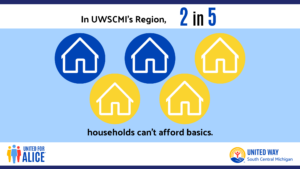Lindsey Neal is no stranger to the practice and benefits of mindfulness.
A former massage therapist who now teaches Spanish and health at Battle Creek Central High School, she leads yoga classes weekly for high school students and works out regularly at a gym as part of her self-care routine.
Still, she says, her own needs often get put on the back burner when life gets stressful.
“It’s easy to forget,” she said.
United Way hosted two retreats at W.K. Kellogg Biological Station in August titled “Put on Your Own Oxygen Mask First,” aimed at helping Neal and others who support children learn to prioritize self-care on a daily basis.
The practice is particularly key in staving off secondary trauma and compassion fatigue, the stress and exhaustion that professionals experience as a result of working with individuals that are experiencing trauma, said Jennifer Nottingham, Associate Director of Community Impact at United Way.
“If you don’t take care of yourself, you can’t take care of them,” Nottingham said.
The retreats featured keynote speaker Shannon Cohen, who delivered powerful messages about the importance of self-care, complemented by sessions on mindfulness by Deb Faling and Launda Wheatley.
Faling is a therapist with Family and Children Services, and Wheatley is a professor at Albion College. Both shared and demonstrated techniques such as breathing, stretching and visualization exercises that attendees can use to stay physically, mentally and emotionally balanced in their everyday work and personal lives. Kalamazoo Youth Development Network and BC Pulse partnered with United Way for the events, connecting attendees to community resources and follow-up information.
“Things like this are really great,” said Neal, who reflected on the retreat as she prepared for the start of classes this week. “I enjoyed learning the compassion meditation and have practiced it several times.”
Others in attendance said they also intended to carry the mindfulness and self-care techniques they learned forward into their everyday lives – mindful breathing, gratitude journaling, yoga, meditation, positive thinking and more.
“It’s not that we don’t know what we need, it’s just we rarely give ourselves the white space to slow down, to keep quiet, and to listen to the voice of our hearts,” said Cohen. “If we’re not giving ourselves grace and space to practice self-care and to embed self-care into our organizations, we can’t have longevity in our work.”
Click here to learn more about Shannon Cohen, and here to learn more about United Way’s education strategy.

Shannon Cohen delivers the keynote at the second of two retreats.

The retreats were held at W.K. Kellogg Biological Station near Gull Lake.

Dozens of educators and others who work with children suffering from trauma learn self-care techniques.

Launda Wheatley leads the group through breathing exercises.

Retreat attendees practice breathing techniques.

Deb Faling introduces the group to the practice of mindfulness.

Participants wrote their personal “battle cries” or mantras on post-it notes for others to draw inspiration from.










